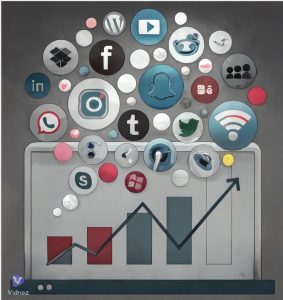Social Media Unbound: Disrupting Governance and Empowering the Masses
By Syed Atiq ul Hassan, Sydney Australia

The advent of the fifth generation of digital communication, alongside the powerful advanced social media tools & applications on high-speed internet platform, has heralded a seismic shift across multiple facets of society.
From reshaping business & investment strategies to influencing healthcare & lifestyle practices, and from redefining sports engagement to modern education system, the impact of these technological advancements is amazing is invasive insightful.
Digital social media platforms like WhatsApp, X (Twitter), Facebook, YouTube, Instagram, Reel, TikTok, and Artificial Intelligence (AI) tools have excelled broad communication utilities to become dynamic hubs of global interaction and exchange of information. These platforms not only facilitate seamless connectivity but also serve as channels for the dissemination of ideas, trends, and news at an unprecedented pace.
become dynamic hubs of global interaction and exchange of information. These platforms not only facilitate seamless connectivity but also serve as channels for the dissemination of ideas, trends, and news at an unprecedented pace.
During the Covid-19 pandemic, Twitter played a vital role in disseminating timely information about vaccination campaigns, as health services worldwide utilized the platform to keep citizens informed.
Nowadays, politicians, state leaders, and celebrities are increasingly using Twitter as a platform for timely interaction with the public, sharing their thoughts and stances on various public affairs.
However, the widespread use of Twitter has also led to concerns and threat in some countries, prompting governments to impose bans on its usage.
Australia is considered as a champion of freedom of speech, yet, in a recent incident in Australia, a video depicting an attack on a priest went viral within minutes. The government, concerned about the video’s impact, requested Twitter (X) to remove it from the platform. When Twitter (X) refused, the government pursued legal action through a case against Twitter (X) but eventually failed to compel Twitter to comply with their request.
One of the most significant transformations brought about by 5th Generation digital revolution is the democratization of media. Gone are the days when journalists, writers, and authors were beholden to publishers for the dissemination of their work. In the past, media outlets operated within a framework of governmental control, wherein decisions regarding the publication or censorship of news were often dictated by vested interests of the publishers, media houses and government agencies.
The rise of social media globally has shattered traditional barriers of establishments, and empowering individuals to become arbiters of their own narratives. Through social media users-generated contents, ordinary citizens can now share their perspectives, experiences, and insights with a global audience instantaneously. The era of gatekeeping by mainstream media, establishment and governmental agencies is gradually giving way to a new era of decentralized information dissemination.
Today, digital mobile user is doing a job of a reporter or journalist with passion and gaining financial benefits from subscribers. Generation Z (Gen-Z) has emerged as a potent force in this paradigm shift. Equipped with smartphones and social media accounts, today’s generation has become adept at uncovering governmental secrets and challenging established power structures and ruling class. Political events, whether they unfold domestically or internationally, now unfold in real-time on social platforms, often preceding coverage by traditional media outlets.
In fact, today, the impact of social media is perhaps most palpable in the realm of politics, where it has disrupted entrenched power dynamics and strategies. While the proliferation of unsolicited content and fake news presents significant challenges, social media has also served as a powerful tool for holding governments accountable. Instances of governmental agencies misconduct and covert agendas are increasingly brought to light through people’s reporting and grassroots activism on social platforms.
The justification for examining the power of social media in reshaping governance and power dynamics extends beyond its immediate impact on political events and societal movements. It explores into the very essence of democracy and the principles of transparency, accountability, and civic engagement.
In today’s interconnected world, where high-speed information flows freely and instantaneously across borders, the role of social media as a catalyst for democratic participation cannot be overstated. By providing individuals with a platform to voice their opinions, mobilize support, and hold authorities accountable, social media has democratized discourse in ways previously unimaginable. Today, this is a great threat to the national and international establishments.
Moreover, the democratization of media facilitated by social platforms has democratized access to information, empowering individuals to make informed decisions and participate meaningfully in the democratic process. No longer are citizens reliant solely on traditional media outlets for news and analysis; social media has democratized access to diverse perspectives and marginalized voices, enriching public discourse and challenging dominant narratives.
Furthermore, the power of social media to expose governmental misconduct and challenge established power structures serves as a bulwark against authoritarianism and tyranny. In an era marked by increasing threats to democratic norms and institutions, social media has emerged as a vigorous force for safeguarding democratic principles and promoting transparency and accountability in governance.
In essence, the topic of social media’s impact on power dynamics and governance is not merely a matter of academic interest; it is a pressing societal concern with far-reaching implications for the future of democracy and human rights. By exploring the multifaceted ways in which social media shapes political discourse, mobilizes public opinion, and holds authorities accountable, we gain valuable insights into the evolving nature of power and governance in this digital era.
A poignant example of social media’s influence can be seen in recent political upheavals, such as the last Pakistani elections. Despite attempts by incumbent authorities to manipulate election outcomes, social media platforms served as a check on such endeavours, empowering public to expose malpractices, fraudulent tactics, and fight for transparency in the electoral process. Ultimately, the only way out government found was to ban the twitter services in Pakistan.
Similarly, ongoing conflicts, such as the Israeli military campaign in Gaza, have been extensively documented and scrutinized on social media platforms. The unfiltered exposure of atrocities committed against the Palestinian population has galvanized international outcry and grassroots movements, prompted mass protests and reshaped political landscapes worldwide.
Recent demonstrations in the US, UK, and other Western countries in support of Palestine exemplify the power of social media to mobilize public opinion and effect change. The widespread dissemination of harrowing images and first-hand accounts of the violence inflicted upon Palestinians has ignited a wave of solidarity across the globe. From street protests to online petitions, social media has served as a catalyst for collective action, challenging governments, and institutions to revaluate their stance on the issue. Using social media, the Universities students’ groups and unions established a global network and held massive protests in the Universities and Colleges in United States to Europe, South Africa to South America and powerful countries. Now many Western countries including US planning to introduce legislation to ban any social media platform when things are gone worst against them, nonetheless, it would be hard to get that approved from the public legislatures and representatives.
In essence, the power of social media lies in its ability to render traditional forms of authoritarian governance obsolete. The old autocratic tendencies of powerful governments, irrespective of their democratic façade, are increasingly incompatible with the transparent, interconnected world fostered by social media. As such, the imperative for governments and institutions is not merely to adapt but to embrace openness and accountability in their governance.
In conclusion, the digital revolution fuelled by social media has ushered in an era of unprecedented connectivity, empowerment, and accountability. While challenges persist, the transformative potential of social media in reshaping power dynamics and governance structures cannot be overstated. It is incumbent upon individuals, governments, and institutions alike to harness this power responsibly for the betterment of society. (The writer is a Sydney-based journalist, political analyst, writer, information science specialist and editor Tribune International, Australia. His email is shassan@tribune-intl.com ).
END




